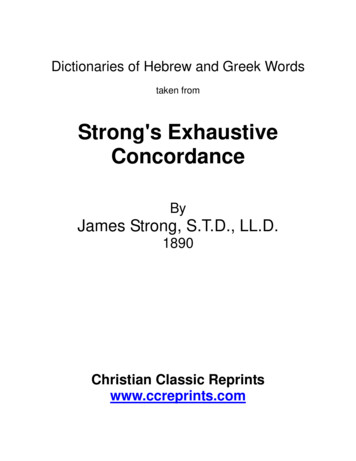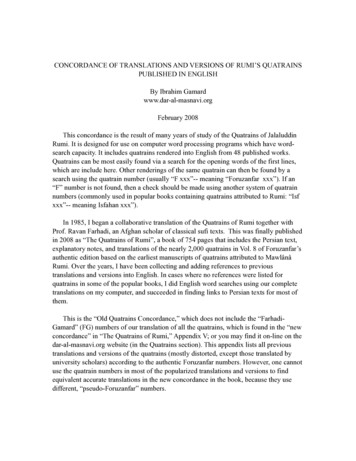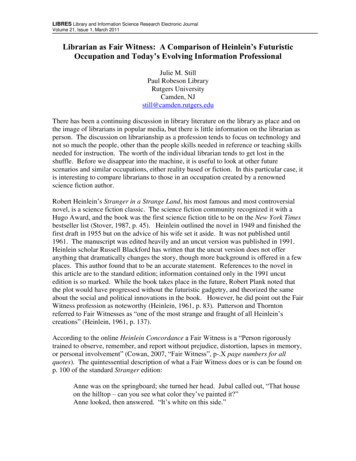
Transcription
Dictionaries of Hebrew and Greek Wordstaken fromStrong's ExhaustiveConcordanceByJames Strong, S.T.D., LL.D.1890BIBLESNET.COM&QUESTIONSGOD.COM
Dictionaries of Hebrew and Greek Wordstaken fromStrong's Exhaustive ConcordancebyJames Strong, S.T.D., LL.D.1890Public Domain -- Copy FreelyFor a hundred years Strong's Dictionaries have been popular with Bible students.By assigning numbers to each unique word in the Old and New Testaments andlisting each word with its number, Strong produced a standard, still used today,for referencing definitions. Bible students, with little or no knowledge ofGreek and Hebrew, are able to use Strong's numbers to learn about the Greek andHebrew of the Bible.
1 a {al'-fah} of Hebrew origin; the first letter of the alphabet; figuratively, only (from itsuse as a numeral) the first: --Alpha. Often used (usually an, before a vowel) also incomposition (as a contraction from 427) in the sense of privation; so, in many words,beginning with this letter; occasionally in the sense of union (as a contraction of 260).See Greek-- 427 See Greek-- 2602 Aaron {ah-ar-ohn'} of Hebrew origin (175); Aaron, the brother of Moses:--Aaron.See HEBREW for 01753 Abaddon {ab-ad-dohn'} of Hebrew origin (11); a destroying angel:--Abaddon. SeeHEBREW for 0114 abares {ab-ar-ace'} from 1 (as a negative particle) and 922; weightless, i.e.(figuratively) not burdensome:--from being burdensome. See Greek-- 1 See Greek-- 9225 Abba {ab-bah'} of Chaldee origin (2); father as a vocative:--Abba. See HEBREW for026 Abel {ab'-el} of Hebrew origin (1893); Abel, the son of Adam:--Abel. See HEBREWfor 018937 Abia {ab-ee-ah'} of Hebrew origin (29); Abijah, the name of two Israelites:--Abia.See HEBREW for 0298 Abiathar {ab-ee-ath'-ar} of Hebrew origin (54); Abiathar, an Israelite:--Abiathar. SeeHEBREW for 0549 Abilene {ab-ee-lay-nay' of foreign origin (compare 58); Abilene, a region of Syria:-Abilene. See HEBREW for 05810 Abioud {ab-ee-ood'} of Hebrew origin (31); Abihud, an Israelite:--Abiud. SeeHEBREW for 03111 Abraam {ab-rah-am'} of Hebrew origin (85); Abraham, the Hebrew patriarch:-Abraham. (In Acts 7:16 the text should probably read Jacob.) See HEBREW for 08512 abussos {ab'-us-sos} from 1 (as a negative particle) and a variation of 1037;depthless, i.e. (specially) (infernal) "abyss":--deep, (bottomless) pit. See Greek-- 1 SeeGreek-- 103713 Agabos {ag'-ab-os} of Hebrew origin (compare 2285); Agabus, an Israelite:-Agabus. See HEBREW for 0228514 agathoergeo {ag-ath-er-gheh'-o} from 18 and 2041; to work good:--do good. SeeGreek-- 18 See Greek-- 2041
15 agathopoieo {ag-ath-op-oy-eh'-o} from 17; to be a well-doer (as a favor or aduty):--(when) do good (well). See Greek-- 1716 agathopolia {ag-ath-op-oy-ee'-ah} from 17; well-doing, i.e. virtue:--well-doing.See Greek-- 1717 agathopoios {ag-ath-op-oy-os'} from 18 and 4160; a well-doer, i.e. virtuous:-them that do well. See Greek for 18 See Greek-- 416018 agathos {ag-ath-os'} a primary word; "good" (in any sense, often as noun):-benefit, good(-s, things), well. Compare 2570. See Greek-- 257019 agathosune {ag-ath-o-soo'-nay} from 18; goodness, i.e. virtue or beneficence:-goodness. See Greek-- 1820 agalliasis {ag-al-lee'-as-is} from 21; exultation; specially, welcome:--gladness,(exceeding) joy. See Greek-- 2121 agalliao {ag-al-lee-ah'-o} from agan (much) and 242; properly, to jump for joy, i.e.exult:--be (exceeding) glad, with exceeding joy, rejoice (greatly). See Greek-- 24222 agamos {ag'-am-os} from 1 (as a negative particle) and 1062; unmarried:-unmarried. See Greek-- 1 See Greek-- 106223 aganakteo {ag-an-ak-teh'-o} from agan (much) and achthos (grief; akin to thebase of 43); to be greatly afflicted, i.e. (figuratively) indignant:--be much (sore)displeased, have (be moved with, with) indignation. See Greek-- 4324 aganaktesis {ag-an-ak'-tay-sis} from 23; indignation:--indignation. See Greek-2325 agapao {ag-ap-ah'-o} perhaps from agan (much) (or compare 5689); to love (in asocial or moral sense):--(be-)love(-ed). Compare 5368. See Greek-- 5689 See Greek-536826 agape {ag-ah'-pay} from 25; love, i.e. affection or benevolence; specially (plural) alove-feast:--(feast of) charity(-ably), dear, love. See Greek-- 2527 agapetos {ag-ap-ay-tos'} from 25; beloved:--(dearly, well) beloved, dear. SeeGreek-- 2528 Agar {ag'-ar} of Hebrew origin (1904); Hagar, the concubine of Abraham:--Hagar.See HEBREW for 0190429 aggareuo {ang-ar-yew'-o} of foreign origin (compare 104); properly, to be acourier, i.e. (by implication) to press into public service:--compel (to go). See HEBREWfor 0104
30 aggeion {ang-eye'-on from aggos (a pail, perhaps as bent; compare the base of43); a receptacle:--vessel. See Greek-- 4331 aggelia {ang-el-ee'-ah} from 32; an announcement, i.e. (by implication) precept:-message. See Greek-- 3232 aggelos {ang'-el-os} from aggello (probably derived from 71; compare 34) (tobring tidings); a messenger; especially an "angel"; by implication, a pastor:--angel,messenger. See Greek-- 71 See Greek-- 3433 age {ag'-eh} imperative of 71; properly, lead, i.e. come on:--go to. See Greek-- 7134 agele {ag-el'-ay} from 71 (compare 32); a drove:--herd. See Greek-- 71 SeeGreek-- 3235 agenealogetos {ag-en-eh-al-og'-ay-tos} from 1 (as negative particle) and 1075;unregistered as to birth:--without descent. See Greek-- 1 See Greek-- 107536 agenes {ag-en-ace'} from 1 (as negative particle) and 1085; properly, without kin,i.e. (of unknown descent, and by implication) ignoble:--base things. See Greek-- 1 SeeGreek-- 108537 hagiazo {hag-ee-ad'-zo} from 40; to make holy, i.e. (ceremonially) purify orconsecrate; (mentally) to venerate:--hallow, be holy, sanctify. See Greek-- 4038 hagiasmos {hag-ee-as-mos'} from 37; properly, purification, i.e. (the state) purity;concretely (by Hebraism) a purifier:--holiness, sanctification. See Greek-- 3739 hagion {hag'-ee-on} neuter of 40; a sacred thing (i.e. spot):--holiest (of all), holyplace, sanctuary. See Greek-- 4040 hagios {hag'-ee-os} from hagos (an awful thing) (compare 53, 2282); sacred(physically, pure, morally blameless or religious, ceremonially, consecrated):--(most)holy (one, thing), saint. See Greek-- 53 See Greek-- 228241 hagiotes {hag-ee-ot'-ace} from 40; sanctity (i.e. properly, the state):--holiness.See Greek-- 4042 hagiosune {hag-ee-o-soo'-nay} from 40; sacredness (i.e. properly, the quality):-holiness. See Greek-- 4043 agkale {ang-kal'-ay} from agkos (a bend, "ache"); an arm (as curved):--arm.44 agkistron {ang'-kis-tron} from the same as 43; a hook (as bent):--hook. SeeGreek-- 43
45 agkura {ang'-koo-rah} from the same as 43; an "anchor" (as crooked):--anchor.See Greek-- 4346 agnaphos {ag'-naf-os} from 1 (as a negative particle) and the same as 1102;properly, unfulled, i.e. (by implication) new (cloth):--new. See Greek-- 1 See Greek-110247 hagneia {hag-ni'-ah} from 53; cleanliness (the quality), i.e. (specially) chastity:-purity. See Greek-- 5348 hagnizo {hag-nid'-zo} from 53; to make clean, i.e. (figuratively) sanctify(ceremonially or morally):--purify (self). See Greek-- 5349 hagnismos {hag-nis-mos'} from 48; a cleansing (the act), i.e. (ceremonially)lustration:--purification. See Greek-- 4850 agnoeo {ag-no-eh'-o} from 1 (as a negative particle) and 3539; not to know(through lack of information or intelligence); by implication, to ignore (throughdisinclination):--(be) ignorant(-ly), not know, not understand, unknown. See Greek-- 1See Greek-- 353951 agnoema {ag-no'-ay-mah} from 50; a thing ignored, i.e. shortcoming:--error. SeeGreek-- 5052 agnoia {ag'-noy-ah} from 50; ignorance (properly, the quality):--ignorance. SeeGreek-- 5053 hagnos {hag-nos'} from the same as 40; properly, clean, i.e. (figuratively)innocent, modest, perfect:--chaste, clean, pure. See Greek-- 4054 hagnotes {hag-not'-ace} from 53; cleanness (the state), i.e. (figuratively)blamelessness:--pureness. See Greek-- 5355 hagnos {hag-noce'} adverb from 53; purely, i.e. honestly:--sincerely. See Greek-5356 agnosia {ag-no-See'-ah} from 1 (as negative particle) and 1108; ignorance(properly, the state):--ignorance, not the knowledge. See Greek-- 1 See Greek-- 110857 agnostos {ag'-noce-tos'} from 1 (as negative particle) and 1110; unknown:-unknown. See Greek-- 1 See Greek-- 111058 agora {ag-or-ah'} from ageiro (to gather; probably akin to 1453); properly, thetown-square (as a place of public resort); by implication, a market or thoroughfare:-market(-place), street. See Greek-- 1453
59 agorazo {ag-or-ad'-zo} from 58; properly, to go to market, i.e. (by implication) topurchase; specially, to redeem:--buy, redeem. See Greek-- 5860 agoraios {ag-or-ah'-yos} from 58; relating to the market-place, i.e. forensic(times); by implication, vulgar:--baser sort, low. See Greek-- 5861 agra {ag'-rah} from 71; (abstractly) a catching (of fish); also (concretely) a haul (offish):--draught. See Greek-- 7162 agrammatos {ag-ram-mat-os} from 1 (as negative particle) and 1121; unlettered,i.e. illiterate:--unlearned. See Greek-- 1 See Greek-- 112163 agrauleo {ag-row-leh'-o} from 68 and 832 (in the sense of 833); to camp out:-abide in the field. See Greek-- 68 See Greek-- 832 See Greek-- 83364 agreuo {ag-rew'-o} from 61; to hunt, i.e. (figuratively) to entrap:--catch. SeeGreek-- 6165 agrielaios {ag-ree-el'-ah-yos} from 66 and 1636; an oleaster:--olive tree (whichis) wild. See Greek-- 66 See Greek-- 163666 agrios {ag'-ree-os} from 68; wild (as pertaining to the country), literally (natural) orfiguratively (fierce):--wild, raging. See Greek-- 6867 Agrippas {ag-rip'-pas} apparently from 66 and 2462; wild-horse tamer; Agrippas,one of the Herods:--Agrippa. See Greek-- 66 See Greek-- 246268 agros {ag-ros'} from 71; a field (as a drive for cattle); genitive case, the country;specially, a farm, i.e. hamlet:--country, farm, piece of ground, land. See Greek-- 7169 agrupneo {ag-roop-neh'-o} ultimately from 1 (as negative particle) and 5258; tobe sleepless, i.e. keep awake:--watch. See Greek-- 1 See Greek-- 525870 agrupnia {ag-roop-nee'-ah from 69; sleeplessness, i.e. a keeping awake:--watch.See Greek-- 6971 ago {ag'-o} a primary verb; properly, to lead; by implication, to bring, drive,(reflexively) go, (specially) pass (time), or (figuratively) induce:--be, bring (forth), carry,(let) go, keep, lead away, be open.72 agoge {ag-o-gay'} reduplicated from 71; a bringing up, i.e. mode of living:-manner of life. See Greek-- 71
73 agon {ag-one'} from 71; properly, a place of assembly (as if led), i.e. (byimplication) a contest (held there); figuratively, an effort or anxiety:--conflict, contention,fight, race. See Greek-- 7174 agonia {ag-o-nee'-ah} from 73; a struggle (properly, the state), i.e. (figuratively)anguish:--agony. See Greek-- 7375 agonizomai {ag-o-nid'-zom-ahee} from 73; to struggle, literally (to compete for aprize), figuratively (to contend with an adversary), or genitive case (to endeavor toaccomplish something):--fight, labor fervently, strive. See Greek-- 7376 Adam {ad-am'} of Hebrew origin (121); Adam, the first man; typically (of Jesus)man (as his representative):--Adam. See HEBREW for 012177 adapanos {ad-ap'-an-os} from 1 (as negative particle); and 1160; costless, i.e.gratuitous:--without expense. See Greek-- 1 See Greek-- 116078 Addi {ad-dee'} probably of Hebrew origin (compare 5716); Addi, an Israelite:-Addi. See HEBREW for 0571679 adelphe {ad-el-fay'} fem of 80; a sister (naturally or ecclesiastically):--sister. SeeGreek-- 8080 adephos {ad-el-fos'} from 1 (as a connective particle) and delphus (the womb); abrother (literally or figuratively) near or remote (much like 1):--brother. See Greek-- 1See Greek-- 181 adelphotes {ad-el-fot'-ace} from 80; brotherhood (properly, the feeling ofbrotherliness), i.e. the (Christian) fraternity:--brethren, brotherhood. See Greek-- 8082 adelos {ad'-ay-los} from 1 (as a negative particle) and 1212; hidden, figuratively,indistinct:--appear not, uncertain. See Greek-- 1 See Greek-- 121283 adelotes {ad-ay-lot'-ace} from 82; uncertainty:--X uncertain. See Greek-- 8284 adelos {ad-ay'-loce} adverb from 82; uncertainly:--uncertainly. See Greek-- 8285 ademoneo {ad-ay-mon-eh'-o} from a derivative of adeo (to be sated to loathing);to be in distress (of mind):--be full of heaviness, be very heavy.86 haides {hah'-dace} from 1 (as negative particle) and 1492; properly, unSeen, i.e."Hades" or the place (state) of departed souls:--grave, hell. See Greek-- 1 See Greek-1492
87 adiakritos {ad-ee-ak'-ree-tos} from 1 (as a negative particle) and a derivative of1252; properly, undistinguished, i.e. (actively) impartial:--without partiality. See Greek-- 1See Greek-- 125288 adialeiptos {ad-ee-al'-ipe-tos} from 1 (as a negative particle) and a derivative of acompound of 1223 and 3007; unintermitted, i.e. permanent:--without ceasing, continual.See Greek-- 1 See Greek-- 1223 See Greek-- 300789 adialeiptos {ad-ee-al-ipe'-toce} adverb from 88; uninterruptedly, i.e. withoutomission (on an appropriate occasion):--without ceasing. See Greek-- {88}90 adiaphthoria {ad-ee-af-thor-ee'-ah} from a derivative of a compound of 1 (as anegative particle) and a derivative of 1311; incorruptibleness, i.e. (figuratively) purity (ofdoctrine):--uncorruptness. See Greek-- 1 See Greek-- 131191 adikeo {ad-ee-keh'-o} from 94; to be unjust, i.e. (actively) do wrong (morally,socially or physically):--hurt, injure, be an offender, be unjust, (do, suffer, take) wrong.See Greek-- 9492 adikema {ad-eek'-ay-mah} from 91; a wrong done:--evil doing, iniquity, matter ofwrong. See Greek-- 9193 adikia {ad-ee-kee'-ah} from 94; (legal) injustice (properly, the quality, byimplication, the act); morally, wrongfulness (of character, life or act):--iniquity, unjust,unrighteousness, wrong. See Greek-- 9494 adikos {ad'-ee-kos} from 1 (as a negative particle) and 1349; unjust; by extensionwicked; by implication, treacherous; specially, heathen:--unjust, unrighteous. SeeGreek-- 1 See Greek-- 134995 adikos {ad-ee'-koce} adverb from 94; unjustly:--wrongfully. See Greek-- 9496 adokimos {ad-ok'-ee-mos} from 1 (as a negative particle) and 1384; unapproved,i.e. rejected; by implication, worthless (literally or morally):--castaway, rejected,reprobate. See Greek - 1 See Greek - 138497 adolos {ad'-ol-os} from 1 (as a negative particle}; and 1388; undeceitful, i.e.(figuratively) unadulterated:--sincere. See Greek- 1 See Greek- 138898 Adramuttenos {ad-ram-oot-tay-nos' from Adramutteion (a place in Asia Minor);Adramyttene or belonging to Adramyttium:--of Adramyttium.99 Adrias {ad-ree'-as} from Adria (a place near its shore); the Adriatic sea (includingthe Ionian):--Adria.
100 hadrotes {had-rot'-ace} from hadros (stout); plumpness, i.e. (figuratively)liberality:--abundance.101 adunateo {ad-oo-nat-eh'-o} from 102; to be unable, i.e. (passively) impossible:-be impossible. See Greek-- 102102 adunatos {ad-oo'-nat-os} from 1 (as a negative particle) and 1415; unable, i.e.weak (literally or figuratively); passively, impossible:--could not do, impossible, impotent,not possible, weak. See Greek-- 1 See Greek-- 1415103 aido {ad'-o} to sing:--sing.104 aei {ah-eye'} from an obsolete primary noun (apparently meaning continuedduration); "ever,"by qualification regularly; by implication, earnestly; --always, ever.105 aetos {ah-et-os'} from the same as 109; an eagle (from its wind-like flight):-eagle. See Greek- 109106 azumos {ad'-zoo-mos} from 1 (as a negative particle) and 2219; unleavened, i.e.(figuratively) uncorrupted; (in the neutral plural) specially (by implication) the Passoverweek:--unleavened (bread). See Greek-- 1 See Greek-- 2219107 Azor {ad-zore'} of Hebrew origin (compare 5809); Azor, an Israelite:--AzoriginSee HEBREW for 05809108 Azotos {ad'-zo-tos} of Hebrew origin (795); Azotus (i.e. Ashdod), a place inPalestine:--Azotus. See HEBREW for 0795109 aer {ah-ayr'} from aemi (to breathe unconsciously, i.e. respire; by analogy, toblow); "air" (as naturally circumambient):--air. Compare 5594. See Greek-- 5594110 athanasia {ath-an-as-ee'-ah} from a compound of 1 (as a negative particle) and2288; deathlessness:--immortality. See Greek-- 1 See Greek-- 2288111 athemitos {ath-em'-ee-tos} from 1 (as a negative particle) and a derivative ofthemis (statute; from the base of 5087); illegal; by implication, flagitious:--abominable,unlawful thing. See Greek-- 1 See Greek-- 5087112 atheos {ath'-eh-os} from 1 (as a negative particle) and 2316; godless:--withoutGod. See Greek-- 1 See Greek-- 2316113 athesmos {ath'-es-mos} from 1 (as a negative particle) and a derivative of 5087(in the sense of enacting); lawless, i.e. (by implication) criminal:--wicked. See Greek-- 1See Greek-- 5087
114 atheteo {ath-et-eh'-o} from a compound of 1 (as a negative particle) and aderivative of 5087; to set aside, i.e. (by implication) to disesteem, neutralize or violate:-cast off, despise, disannul, frustrate, bring to nought, reject. See Greek-- 1 See Greek-5087115 athetesis {ath-et'-ay-sis} from 114; cancellation (literally or figuratively):-disannulling, put away. See Greek-- 114116 Athenai {ath-ay-nahee} plural of Athene (the goddess of wisdom, who wasreputed to have founded the city); Athenoe, the capitol of Greece:-- Athens.117 Athenaios {ath-ay-nah'-yos} from 116; an Athenoean or inhabitant of Athenae:-Athenian. See Greek-- 116118 athleo {ath-leh'-o} from athlos (a contest in the public lists); to contend in thecompetitive games:--strive.119 athlesis {ath'-lay-sis} from 118; a struggle (figuratively):--fight. See Greek-- 118120 athumeo {ath-oo-meh'-o} from a compound of 1 (as a negative particle) and2372; to be spiritless, i.e. disheartened:--be dismayed. See Greek-- 1 See Greek-- 2372121 athoos {ath'-o-os} from 1 (as a negative particle) and probably a derivative of5087 (meaning a penalty); not guilty:--innocent. See Greek-- 1 See Greek-- 5087122 aigeos {ah'-ee-ghi-os} from aix (a goat); belonging to a goat:--goat.123 aigialos {ahee-ghee-al-os'} from aisso (to rush) and 251 (in the sense of thesea; a beach (on which the waves dash):--shore. See Greek-- 251124 Aiguptios {ahee-goop'-tee-os} from 125; an Ægyptian or inhabitant ofÆgyptus:--Egyptian. See Greek-- 125125 Aiguptos {ah'-ee-goop-tos} of uncertain derivation:--Ægyptus, the land of theNile:--Egypt.126 aidios {ah-id'-ee-os} from 104; everduring (forward and backward, or forwardonly):--eternal, everlasting. See Greek-- 104127 aidos {ahee-doce'} perhaps from 1 (as a negative particle) and 1492 (throughthe idea of downcast eyes); bashfulness, i.e. (towards men), modesty or (towards God)awe:--reverence, shamefacedness. See Greek-- 1 See Greek-- 1492128 Aithiops {ahee-thee'-ops} from aitho (to scorch) and ops (the face, from 3700);an Æthiopian (as a blackamoor):--Ethiopian. See Greek-- 3700
129 haima {hah'-ee-mah} of uncertain derivation; blood, literally (of men or animals),figuratively (the juice of grapes) or specially (the atoning blood of Christ); by implication,bloodshed, also kindred:--blood.130 haimatekchusia {hahee-mat-ek-khoo-See'-ah} from 129 and a derivative of1632; an effusion of blood:--shedding of blood. See Greek-- 129 See Greek-- 1632131 haimorrheo {hahee-mor-hreh'-o} from 129 and 4482; to flow blood, i.e. have ahoemorrhage:--diseased with an issue of blood. See Greek-- 129 See Greek-- 4482132 Aineas {ahee-neh'-as} of uncertain derivation; Aeneas, an Israelite:--Aeneas.133 ainesis {ah'-ee-nes-is} from 134; a praising (the act), i.e. (specially) a thank(offering):--praise. See Greek-- 134134 aineo {ahee-neh'-o} from 136; to praise (God):--praise. See Greek-- 136135 ainigma {ah'-ee-nig-ma} from a derivative of 136 (in its primary sense); anobscure saying ("enigma"), i.e. (abstractly) obscureness:--X darkly. See Greek-- 136136 ainos {ah'-ee-nos} apparently a prime word; properly, a story, but used in thesense of 1868; praise (of God):--praise. See Greek-- 1868137 Ainon {ahee-nohn'} of Hebrew origin (a derivative of 5869, place of springs);Ænon, a place in Palestine:--Ænon. See Greek-- 5869138 haireomai {hahee-reh'-om-ahee} probably akin to 142; to take for oneself, i.e. toprefer:--choose. Some of the forms are borrowed from a cognate hellomai hel'-lomahee; which is otherwise obsolete. See Greek-- 142139 hairesis {hah'-ee-res-is} from 138; properly, a choice, i.e. (specially) a party or(abstractly) disunion:--heresy (which is the Greek word itself), sect. See Greek-- 138140 hairetizo {hahee-ret-id'-zo} from a derivative of 138; to make a choice:--choose.See Greek-- 138141 hairetikos {hahee-ret-ee-kos'} from the same as 140; a schismatic:--heretic (theGreek word itself). See Greek-- 140142 airo {ah'-ee-ro} a primary root; to lift up; by implication, to take up or away;figuratively, to raise (the voice), keep in suspense (the mind), specially, to sail away (i.e.weigh anchor); by Hebraism (compare 5375) to expiate sin:--away with, bear (up), carry,lift up, loose, make to doubt, put away, remove, take (away, up). See HEBREW for05375
143 aisthanomai {ahee-sthan'-om-ahee} of uncertain derivation; to apprehend(properly, by the senses):--perceive.144 aisthesis {ah'-ee-sthay-sis} from 143; perception, i.e. (figuratively)discernment:--judgment. See Greek-- 143145 aistheterion {ahee-sthay-tay'-ree-on} from a derivative of 143; properly, anorgan of perception, i.e. (figuratively) judgment:--senses. See Greek-- 143146 aischrokerdes {ahee-skhrok-er-dace'} from 150 and kerdos (gain); sordid:-given to (greedy of) filthy lucre. See Greek-- 150147 aischrokerdos {ahee-skhrok-er-doce'} adverb from 146; sordidly:--for filthylucre's sake. See Greek-- 146148 aischrologia {ahee-skhrol-og-ee'-ah} from 150 and 3056; vile conversation:-filthy communication. See Greek-- 150 See Greek-- 3056149 aischron {ahee-skhron'} neuter of 150; a shameful thing, i.e. indecorum:-shame. See Greek-- 150150 aischros {ahee-skhros'} from the same as 153; shameful, i.e. base (specially,venal):--filthy. See Greek-- 153151 aischrotes {ahee-skhrot'-ace} from 150; shamefulness, i.e. obscenity:-filthiness. See Greek-- 150152 aischune {ahee-skhoo'-nay} from 153; shame or disgrace (abstractly orconcretely):--dishonesty, shame. See Greek-- 153153 aischunomai {ahee-skhoo'-nom-ahee} from aischos (disfigurement, i.e.disgrace); to feel shame (for oneself):--be ashamed.154 aiteo {ahee-teh'-o} of uncertain derivation; to ask (in genitive case):--ask, beg,call for, crave, desire, require. Compare 4441. See Greek-- 4441155 aitema {ah'-ee-tay-mah} from 154; a thing asked or (abstractly) an asking:-petition, request, required. See Greek-- 154156 aitia {ahee-tee'-a} from the same as 154; a cause (as if asked for), i.e. (logical)reason (motive, matter), (legal) crime (alleged or proved):--accusation, case, cause,crime, fault, (wh-)ere(-fore). See Greek-- 154157 aitiama {ahee-tee'-am-ah} from a derivative of 156; a thing charged:--complaint.See Greek-- 156
158 aition {ah'-ee-tee-on} neuter of 159; a reason or crime (like 156):--cause, fault.See Greek-- 159 See Greek-- 156159 aitios {ah'-ee-tee-os} from the same as 154; causative, i.e. (concretely) acauser:--author. See Greek-- 154160 aiphnidios {aheef-nid'-ee-os} from a compound of 1 (as a negative particle) and5316 (compare 1810) (meaning non-apparent); unexpected, i.e. (adverbially) suddenly:-sudden, unawares. See Greek-- 1 See Greek-- 5316 See Greek-- 1810161 aichmalosia {aheekh-mal-o-See'-ah} from 164; captivity:--captivity. See Greek-164162 aichmaloteuo {aheekh-mal-o-tew'-o} from 164; to capture (like 163):--leadcaptive. See Greek-- 164 See Greek-- 163163 aichmalotizo {aheekh-mal-o-tid'-zo} from 164; to make captive:--lead awaycaptive, bring into captivity. See Greek-- 164164 aichmalotos {aheekh-mal-o-tos'} from aichme (a spear) and a derivative of thesame as 259; properly, a prisoner of war, i.e. (genitive case) a captive:--captive. SeeGreek-- 259165 aion {ahee-ohn'} from the same as 104; properly, an age; by extension,perpetuity (also past); by implication, the world; specially (Jewish) a Messianic period(present or future):--age, course, eternal, (for) ever(-more), (n-)ever, (beginning of the ,while the) world (began, without end). Compare 5550. See Greek-- 104 See Greek-5550166 aionios {ahee-o'-nee-os} from 165; perpetual (also used of past time, or pastand future as well):--eternal, for ever, everlasting, world (began). See Greek-- 165167 akatharsia {ak-ath-ar-See'-ah} from 169; impurity (the quality), physically ormorally:--uncleanness. See Greek-- 169168 akathartes {ak-ath-ar'-tace} from 169; impurity (the state), morally:--filthiness.See Greek-- 169169 akathartos {ak-ath'-ar-tos} from 1 (as a negative particle) and a presumedderivative of 2508 (meaning cleansed); impure (ceremonially, morally (lewd) or specially,(demonic)):--foul, unclean. See Greek-- 1 See Greek-- 2508170 akaireomai {ak-ahee-reh'-om-ahee} from a compound of 1 (as a negativeparticle) and 2540 (meaning unseasonable); to be inopportune (for oneself), i.e. to fail ofa proper occasion:--lack opportunity. See Greek-- 1 See Greek-- 2540
171 akairos {ak-ah'-ee-roce} adverb from the same as 170; inopportunely:--out ofseason. See Greek-- 170172 akakos {ak'-ak-os} from 1 (as a negative particle) and 2556; not bad, i.e.(objectively) innocent or (subjectively) unsuspecting:--harmless, simple. See Greek-- 1See Greek-- 2556173 akantha {ak'-an-thah} probably from the same as 188; a thorn:--thorn. SeeGreek-- 188174 akanthinos {ak-an'-thee-nos} from 173; thorny:--of thorns. See Greek-- 173175 akarpos {ak'-ar-pos} from 1 (as a negative particle) and 2590; barren (literally orfiguratively):--without fruit, unfruitful. See Greek-- 1 See Greek-- 2590176 akatagnostos {ak-at-ag'-noce-tos} from 1 (as a negative particle) and aderivative of 2607; unblamable:--that cannot be condemned. See Greek-- 1 See Greek-2607177 akatakaluptos {ak-at-ak-al'-oop-tos} from 1 (as a negative particle) and aderivative of a compound of 2596 and 2572; unveiled:--uncovered. See Greek-- 1 SeeGreek-- 2596 See Greek-- 2572178 akatakritos {ak-at-ak'-ree-tos} from 1 (as a negative particle) and a derivative of2632; without (legal) trial:--uncondemned. See Greek-- 1 See Greek-- 2632179 akatalutos {ak-at-al'-oo-tos} from 1 (as a negative particle) and a derivative of2647; indissoluble, i.e. (figuratively) permanent:--endless. See Greek-- 1 See Greek-{2647}180 akatapaustos {ak-at-ap'-ow-stos} from 1 (as a negative particle) and aderivative of 2664; unrefraining:--that cannot cease. See Greek-- 1 See Greek-- 2664181 akatastasia {ak-at-as-tah-See'-ah} from 182; instability, i.e. disorder:-commotion, confusion, tumult. See Greek-- 182182 akatastatos {ak-at-as'-tat-os} from 1 (as a negative particle) and a derivative of2525; inconstant:--unstable. See Greek-- 1 See Greek-- 2525183 akataschetos {ak-at-as'-khet-os} from 1 (as a negative particle) and a derivativeof 2722; unrestrainable:--unruly. See Greek-- 1 See Greek-- 2722184 Akeldama {ak-el-dam-ah'} of Chaldee origin (meaning field of blood;corresponding to 2506 and 1818); Akeldama, a place near Jerusalem:--Aceldama. SeeHEBREW for 02506 See HEBREW for 01818
185 akeraios {ak-er'-ah-yos} from 1 (as a negative particle) and a presumedderivative of 2767; unmixed, i.e. (figuratively) innocent:--harmless, simple. See Greek-1 See Greek-- 2767186 aklines {ak-lee-nace'} from 1 (as a negative particle) and 2827; not leaning, i.e.(figuratively) firm:--without wavering. See Greek-- 1 See Greek-- 2827187 akmazo {ak-mad'-zo} from the same as 188; to make a point, i.e. (figuratively)mature:--be fully ripe. See Greek-- 188188 akmen {ak-mane'} accusative case of a noun ("acme") akin to ake (a point) andmeaning the same; adverbially, just now, i.e. still:--yet.189 akoe {ak-o-ay'} from 191; hearing (the act, the sense or the thing heard):-audience, ear, fame, which ye heard, hearing, preached, report, rumor. See Greek-- 191190 akoloutheo {ak-ol-oo-theh'-o} from 1 (as a particle of union) and keleuthos (aroad); properly, to be in the same way with, i.e. to accompany (specially, as a disciple):-follow, reach. See Greek-- 1191 akouo {ak-oo'-o} a primary verb; to hear (in various senses):--give (in the)audience (of), come (to the ears), (shall) hear(-er, -ken), be noised, be reported,understand.192 akrasia {ak-ras-ee'-a} from 193; want of self-restraint:--excess, incontinency.See Greek-- 193193 akrates {ak-rat'-ace} from 1 (as a negative particle) and 2904; powerless, i.e.without self-control:--incontinent. See Greek-- 1 See Greek-- 2904194 akratos {ak'-rat-os} from 1 (as a negative particle) and a presumed derivative of2767; undiluted:--without mixture. See Greek-- 1 See Greek-- 2767195 akribeia {ak-ree'-bi-ah} from the same as 196; exactness:--perfect manner. SeeGreek-- 196196 akribestatos {ak-ree-bes'-ta-tos} superlative of akribes (a derivative of the sameas 206); most exact:--most straitest. See Greek-- 206197 akribesteron {ak-ree-bes'-ter-on} neuter of the comparative of the same as 196;(adverbially) more exactly:--more perfect(-ly). See Greek-- 196198 akriboo {ak-ree-bo'-o} from the same as 196; to be exact, i.e. ascertain:-enquire diligently. See Greek-- 196
199 akribos {ak-ree-boce'} adverb from the same as 196; exactly:--circumspectly,diligently, perfect(-ly). See Greek-- 196200 akris {ak-rece'} apparently from the same as 206; a locust (as pointed, or aslighting on the top of vegetation):--locust. See Greek-- 206201 akroaterion {ak-ro-at-ay'-ree-on} from 202; an audience-room:--place ofhearing. See Greek-- 202202 akroates {ak-ro-at-ace'} from akroaomai (to listen; apparently an intensive of191); a hearer (merely):--hearer. See Greek-- 191203 akrobustia {ak-rob-oos-tee'-ah} from 206 and probably a modified form ofposthe (the penis or male sexual organ); the prepuce; by implication, an uncircumcised(i.e. gentile, figuratively, unregenerate) state or person:--not circumcised, uncircumcised(with 2192), uncircumcision. See Greek-- 206 See Greek-- 2192204 akrogoniaios {ak-rog-o-nee-ah'-yos from 206 and 1137; belonging to theextreme corner:--c
Bible students, with little or no knowledge of Greek and Hebrew, are able to use Strong's numbers to learn about the Greek and Hebrew of the Bible. 1 a {al'-fah} of Hebrew origin; the first letter of the alphabet; figuratively, only (from its use as a numeral) the first:










